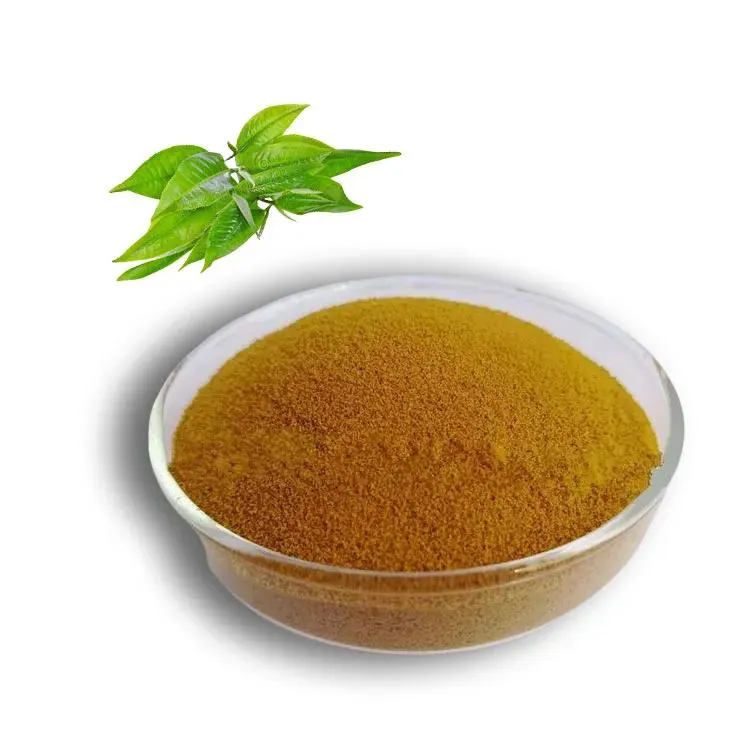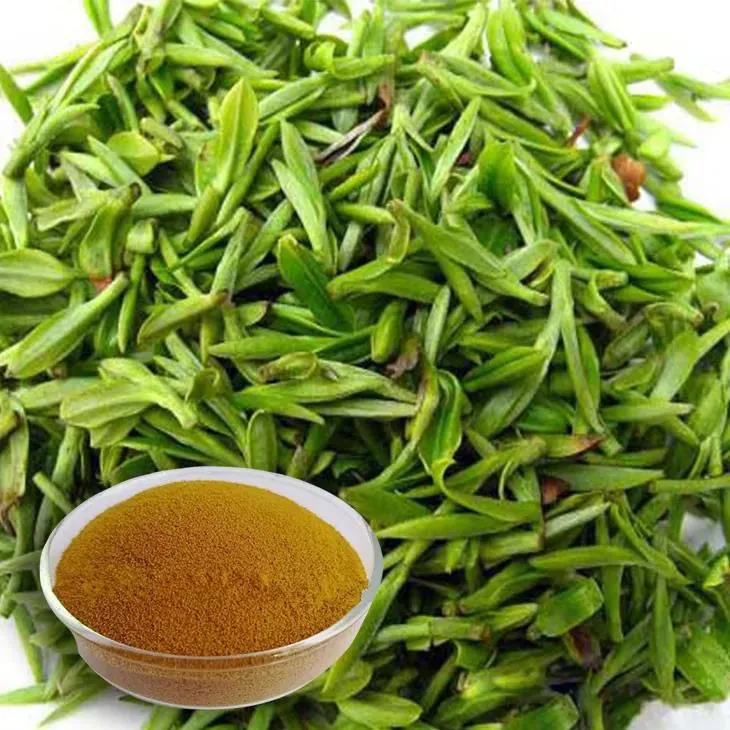- 0086-571-85302990
- sales@greenskybio.com
All about Green Tea Extract.
2024-12-19

Introduction
Green Tea Extract has been gaining significant attention in recent years due to its numerous health - promoting properties. It is sourced from the leaves of the Camellia sinensis plant, which is native to Asia and has been consumed as a beverage for thousands of years. The extraction process yields a concentrated form of the bioactive compounds present in green tea, making it a potent supplement with a wide range of potential applications.

Bioactive Compounds in Green Tea Extract
Green Tea Extract contains a rich variety of bioactive compounds, with polyphenols being the most notable. The major polyphenols in green tea are catechins, which include epigallocatechin - 3 - gallate (EGCG), epicatechin - 3 - gallate (ECG), epigallocatechin (EGC), and epicatechin (EC). These catechins are responsible for many of the health benefits associated with green tea extract.
Another important component is caffeine, which provides a mild stimulant effect. However, the amount of caffeine in green tea extract is generally lower compared to coffee, and it is often combined with other compounds in a way that may have a different effect on the body.

Antioxidant Properties
The high - content antioxidants in green tea extract are one of its most remarkable features. Antioxidants play a crucial role in protecting the body's cells from oxidative damage. Free radicals, which are highly reactive molecules, can cause damage to cells, DNA, and proteins. This oxidative stress is associated with various diseases, including cancer, heart disease, and neurodegenerative disorders.
Green tea catechins, especially EGCG, are powerful antioxidants. They work by scavenging free radicals and preventing the oxidation of lipids in cell membranes. This antioxidant activity not only helps to maintain the integrity of cells but also has implications for overall health and longevity.

Benefits for Cardiovascular Health
Green tea extract has been shown to have several positive effects on cardiovascular health.
Cholesterol - Lowering Effects
Studies have suggested that green tea extract can help to reduce cholesterol levels, particularly LDL cholesterol (the "bad" cholesterol). The catechins in green tea may interfere with the absorption of dietary cholesterol in the intestine and also affect cholesterol metabolism in the liver. By reducing LDL cholesterol levels, green tea extract may contribute to a lower risk of developing heart disease.
Improvement of Blood Vessel Function
It also plays a role in improving blood vessel function. Green tea extract can promote the relaxation of blood vessels, which helps to lower blood pressure. This is achieved through the activation of endothelial - derived nitric oxide synthase (eNOS), which produces nitric oxide. Nitric oxide is a signaling molecule that causes blood vessels to dilate, improving blood flow and reducing the risk of atherosclerosis (hardening of the arteries).
Potential Anti - Cancer Effects
The possible anti - cancer effects of green tea extract are an area of active research. In vitro and animal studies have shown promising results, although more research is needed to confirm these effects in humans.
Green tea catechins, particularly EGCG, have been shown to have anti - proliferative, anti - angiogenic, and pro - apoptotic effects on cancer cells. Anti - proliferative means that they can inhibit the growth and division of cancer cells. Anti - angiogenic refers to the ability to prevent the formation of new blood vessels that tumors need to grow and spread. Pro - apoptotic means that they can induce programmed cell death in cancer cells.
However, it is important to note that while green tea extract may have potential as a complementary approach in cancer prevention or treatment, it should not be considered a substitute for conventional medical therapies.
Applications in Dietary Supplements and Functional Foods
Green tea extract is a popular ingredient in many dietary supplements and functional foods.
Dietary Supplements
As a dietary supplement, green tea extract is often available in capsule or tablet form. It is marketed for various health purposes, such as weight loss, improved energy, and enhanced immune function. However, consumers should be cautious when using dietary supplements and should consult a healthcare provider before starting any new supplement regimen.
Functional Foods
It is also incorporated into functional foods, such as energy bars, drinks, and fortified cereals. These products are designed to provide additional health benefits beyond basic nutrition. For example, a green tea - infused energy bar may claim to provide a natural boost of energy and antioxidants.
Safety and Precautions
While green tea extract is generally considered safe for most people when consumed in moderation, there are some precautions to be aware of.
- Caffeine Sensitivity: Since green tea extract contains caffeine, individuals who are sensitive to caffeine may experience side effects such as jitters, insomnia, or increased heart rate. Pregnant or breastfeeding women should also limit their caffeine intake, including from green tea extract.
- Drug Interactions: Green tea extract may interact with certain medications. For example, it can affect the metabolism of drugs that are metabolized by the liver's cytochrome P450 enzyme system. Therefore, if you are taking any medications, it is important to consult your doctor before using green tea extract.
- Quality and Purity: When purchasing green tea extract products, it is crucial to ensure their quality and purity. Look for products from reputable manufacturers that are tested for contaminants and have accurate labeling.
Conclusion
Green tea extract is a remarkable substance with a wide range of potential health benefits. Its antioxidant properties, positive effects on cardiovascular health, and potential anti - cancer effects make it an attractive option for those interested in natural health remedies. However, as with any supplement or natural product, it is important to use it responsibly and be aware of any potential risks. With further research, the full potential of green tea extract in promoting health and well - being is likely to be more fully understood.
FAQ:
What are the main bioactive compounds in green tea extract?
Green tea extract contains various bioactive compounds, such as catechins (including epigallocatechin - 3 - gallate, or EGCG), which are well - known for their antioxidant properties. Flavonoids and polyphenols are also among the important bioactive components.
How does green tea extract protect cells from oxidative damage?
The antioxidants in green tea extract, mainly catechins, work by neutralizing free radicals. Free radicals are unstable molecules that can cause damage to cells, DNA, and proteins. The antioxidants donate electrons to these free radicals, thus preventing them from causing oxidative harm to cells.
Can green tea extract really help with cardiovascular health?
Yes, it can. Green tea extract may help in reducing cholesterol levels, particularly LDL (low - density lipoprotein) cholesterol, which is often referred to as bad" cholesterol. It also improves blood vessel function by promoting vasodilation, which helps in maintaining healthy blood pressure and overall cardiovascular function.
What is the current research status on the anti - cancer effects of green tea extract?
Research on the anti - cancer effects of green tea extract is ongoing. In vitro and some in vivo studies have shown that certain components in green tea extract, like EGCG, may have anti - proliferative effects on cancer cells, meaning they can inhibit the growth and spread of cancer cells. However, more clinical trials are needed to fully understand its potential in cancer prevention and treatment.
Are there any side effects of taking green tea extract?
When taken in moderation as part of a normal diet or dietary supplement, green tea extract is generally safe for most people. However, excessive consumption may cause some side effects such as nausea, insomnia, or increased heart rate, mainly due to its caffeine content. Also, it may interact with certain medications, so it's important to consult a doctor if you are on other medications.
Related literature
- "Green Tea and Health: A Review of the Current Evidence"
- "The Bioactive Compounds in Green Tea Extract: Their Properties and Potential Health Benefits"
- "Green Tea Extract in Cardiovascular Disease Prevention: A Meta - Analysis"
- ▶ Hesperidin
- ▶ citrus bioflavonoids
- ▶ plant extract
- ▶ lycopene
- ▶ Diosmin
- ▶ Grape seed extract
- ▶ Sea buckthorn Juice Powder
- ▶ Beetroot powder
- ▶ Hops Extract
- ▶ Artichoke Extract
- ▶ Reishi mushroom extract
- ▶ Astaxanthin
- ▶ Green Tea Extract
- ▶ Curcumin Extract
- ▶ Horse Chestnut Extract
- ▶ Other Problems
- ▶ Boswellia Serrata Extract
- ▶ Resveratrol Extract
- ▶ Marigold Extract
- ▶ Grape Leaf Extract
- ▶ blog3
- ▶ blog4
- ▶ blog5
-
Pure 85% Tomentil Extract.
2024-12-19
-
Motherwort Extract
2024-12-19
-
Apricot Powder
2024-12-19
-
Tamarind extract powder
2024-12-19
-
Andrographis Paniculata Extract Powder
2024-12-19
-
Grape Leaf Extract
2024-12-19
-
Saw Palmetto Extract
2024-12-19
-
Fenugreek Extract Powder
2024-12-19
-
Chasteberry Extract
2024-12-19
-
Curcuma Longa Extract/Turmeric extract
2024-12-19
-
Aminolevulinic acid
2024-12-19





















